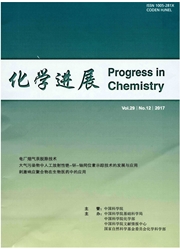

 中文摘要:
中文摘要:
蛋白质是一类具有独特三维空间结构的生物高分子,其分子内部非共价键协同作用是形成三维空间结构的重要驱动力。同时,蛋白质分子与其他高分子之间也可以通过非共价键作用实现自组装。高分子链和蛋白质的结构特征是实现自组装的关键,溶液pH值、离子强度以及温度的变化会影响它们之间非共价键作用的类型和强度。本文归纳了水溶性高分子、嵌段共聚物和多糖与球状蛋白自组装的最新研究进展,分别从分子结构特征和溶液性质等因素讨论了其对高分子与蛋白质实现自组装的影响。其中,多糖与蛋白质的非共价键作用是化学与生物科学交叉领域最为活跃的研究课题之一,通过研究蛋白质与其他高分子的非共价键作用,对于理解和认识生命过程的本质与规律具有重要的意义,同时,在材料科学、纳米技术、食品科学等相关领域具有重要的应用价值。
 英文摘要:
英文摘要:
Protein is a class of major biomacromolecules with a unique three-dimensional spatial structures. The intramolecular cooperative non-covalent interactions of protein play a crucial role in formation of this structure. Meanwhile, self-assembly of protein with other polymers can be also induced by these interactions. The structures of polymer chain and protein play a key role in the self-assembly of protein with polymer. The changes of pH, ionic strength and temperature of solution affect the type and intensity of non-covalent interactions. The present review summaries the latest research on self-assembly of the water-soluble polymers, block copolymers, and polysaccharides with globular protein. The molecular structure of polymers and solution properties effecting on the self-assembly of protein with polymers are discussed in details. Especially, non-covalent interaction between polysaccharide and protein is a major research topic in interdisciplinary field between chemistry and biology. Understanding of non-covalent interactions between protein and other polymers is benefit to discover the nature and rule of life, and has important applications in materials science, nanotechnology, food science, etc.
 同期刊论文项目
同期刊论文项目
 同项目期刊论文
同项目期刊论文
 Synthesis of cationic polyacrylamide by aqueous two-phase polymerization in poly(ethylene glycol) ch
Synthesis of cationic polyacrylamide by aqueous two-phase polymerization in poly(ethylene glycol) ch Preparation of chitosan-poly(acrylic acid) nanoparticles and its solubilizing abilities for water-in
Preparation of chitosan-poly(acrylic acid) nanoparticles and its solubilizing abilities for water-in 期刊信息
期刊信息
